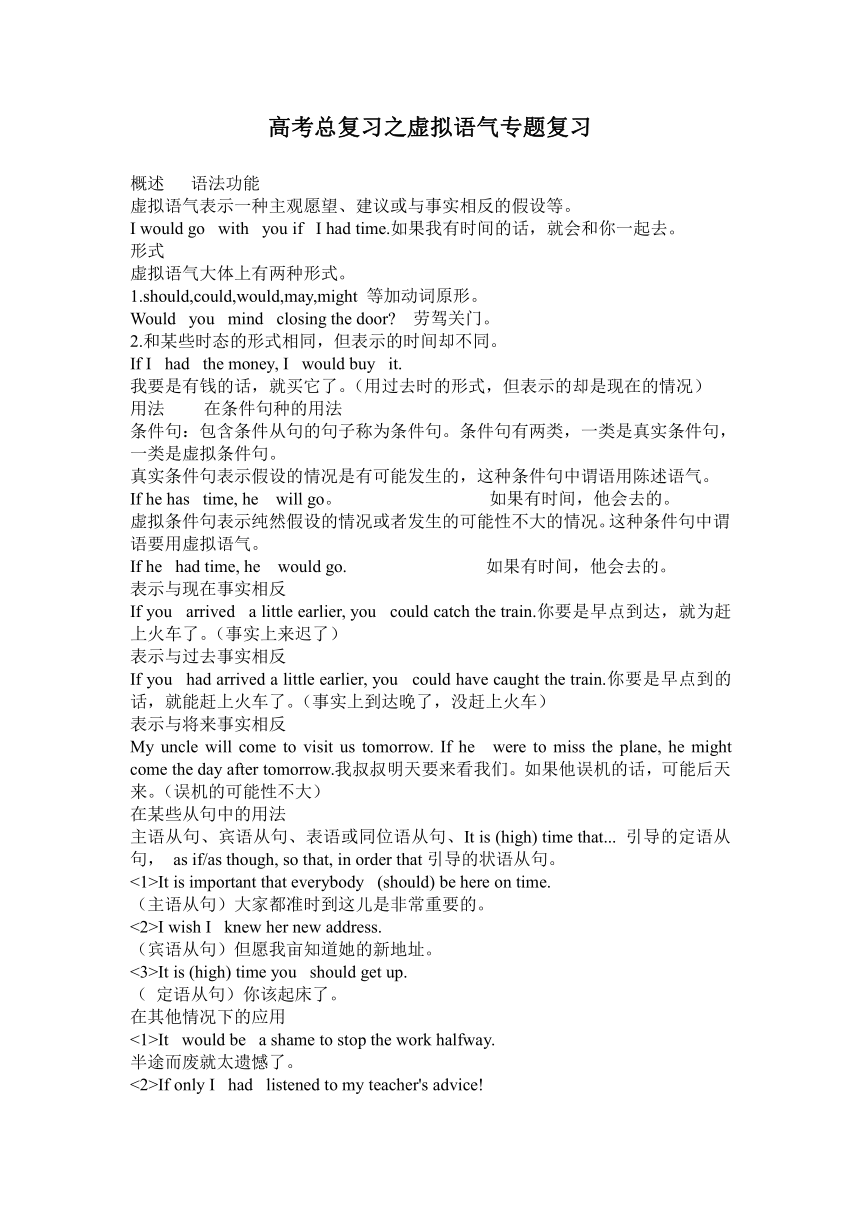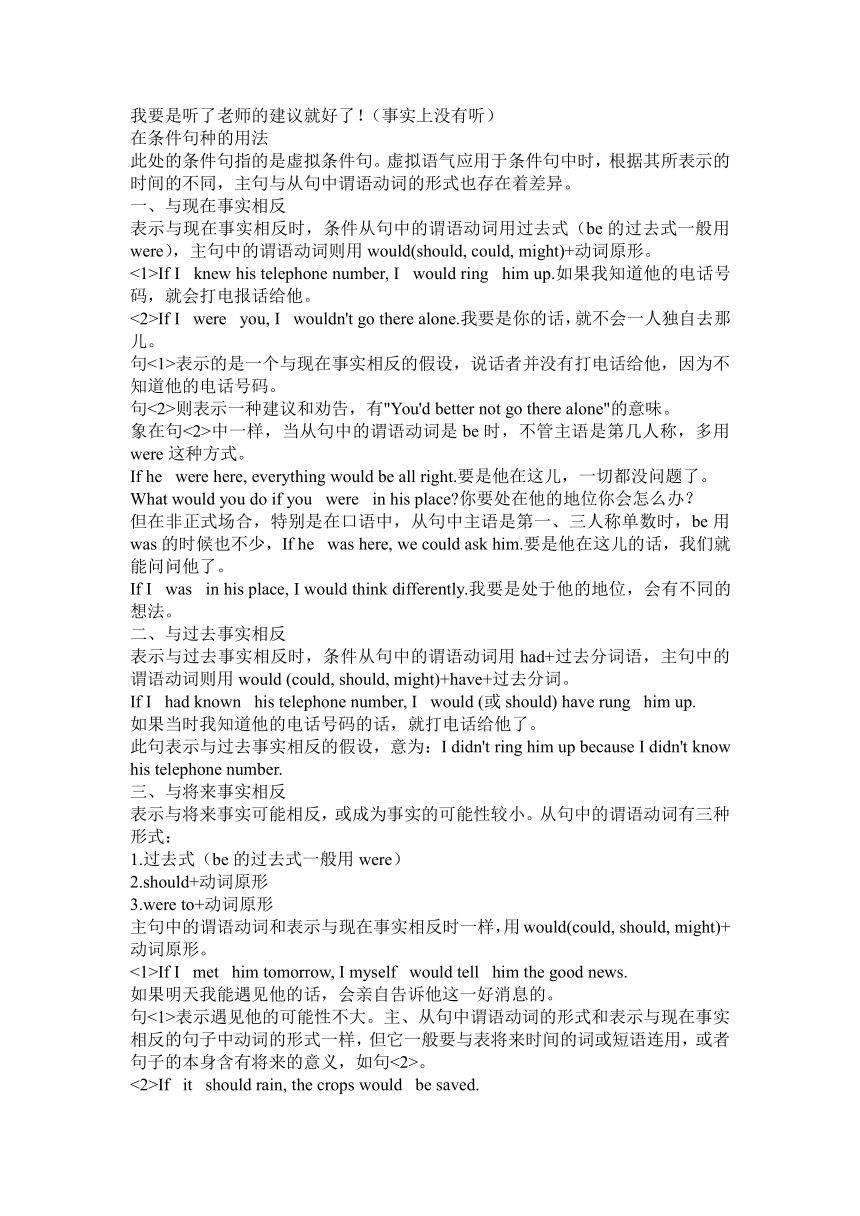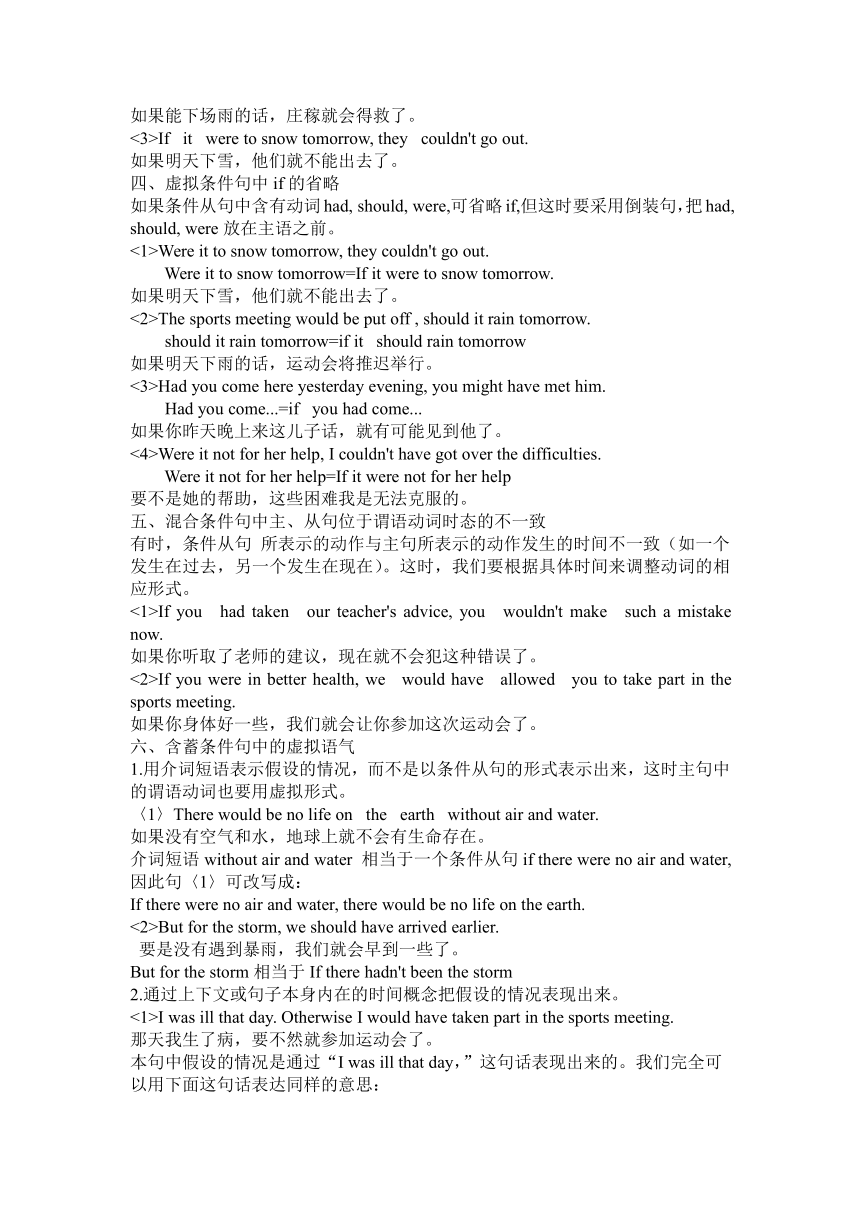高考总复习之虚拟语气专题复习[下学期]
图片预览



文档简介
高考总复习之虚拟语气专题复习
概述 语法功能
虚拟语气表示一种主观愿望、建议或与事实相反的假设等。
I would go with you if I had time.如果我有时间的话,就会和你一起去。
形式
虚拟语气大体上有两种形式。
1.should,could,would,may,might 等加动词原形。
Would you mind closing the door 劳驾关门。
2.和某些时态的形式相同,但表示的时间却不同。
If I had the money, I would buy it.
我要是有钱的话,就买它了。(用过去时的形式,但表示的却是现在的情况)
用法 在条件句种的用法
条件句:包含条件从句的句子称为条件句。条件句有两类,一类是真实条件句,一类是虚拟条件句。
真实条件句表示假设的情况是有可能发生的,这种条件句中谓语用陈述语气。
If he has time, he will go。 如果有时间,他会去的。
虚拟条件句表示纯然假设的情况或者发生的可能性不大的情况。这种条件句中谓语要用虚拟语气。
If he had time, he would go. 如果有时间,他会去的。
表示与现在事实相反
If you arrived a little earlier, you could catch the train.你要是早点到达,就为赶上火车了。(事实上来迟了)
表示与过去事实相反
If you had arrived a little earlier, you could have caught the train.你要是早点到的话,就能赶上火车了。(事实上到达晚了,没赶上火车)
表示与将来事实相反
My uncle will come to visit us tomorrow. If he were to miss the plane, he might come the day after tomorrow.我叔叔明天要来看我们。如果他误机的话,可能后天来。(误机的可能性不大)
在某些从句中的用法
主语从句、宾语从句、表语或同位语从句、It is (high) time that... 引导的定语从句, as if/as though, so that, in order that引导的状语从句。
<1>It is important that everybody (should) be here on time.
(主语从句)大家都准时到这儿是非常重要的。
<2>I wish I knew her new address.
(宾语从句)但愿我亩知道她的新地址。
<3>It is (high) time you should get up.
( 定语从句)你该起床了。
在其他情况下的应用
<1>It would be a shame to stop the work halfway.
半途而废就太遗憾了。
<2>If only I had listened to my teacher's advice!
我要是听了老师的建议就好了!(事实上没有听)
在条件句种的用法
此处的条件句指的是虚拟条件句。虚拟语气应用于条件句中时,根据其所表示的时间的不同,主句与从句中谓语动词的形式也存在着差异。
一、与现在事实相反
表示与现在事实相反时,条件从句中的谓语动词用过去式(be的过去式一般用were),主句中的谓语动词则用would(should, could, might)+动词原形。
<1>If I knew his telephone number, I would ring him up.如果我知道他的电话号码,就会打电报话给他。
<2>If I were you, I wouldn't go there alone.我要是你的话,就不会一人独自去那儿。
句<1>表示的是一个与现在事实相反的假设,说话者并没有打电话给他,因为不知道他的电话号码。
句<2>则表示一种建议和劝告,有"You'd better not go there alone"的意味。
象在句<2>中一样,当从句中的谓语动词是be时,不管主语是第几人称,多用were这种方式。
If he were here, everything would be all right.要是他在这儿,一切都没问题了。
What would you do if you were in his place 你要处在他的地位你会怎么办?
但在非正式场合,特别是在口语中,从句中主语是第一、三人称单数时,be用was的时候也不少,If he was here, we could ask him.要是他在这儿的话,我们就能问问他了。
If I was in his place, I would think differently.我要是处于他的地位,会有不同的想法。
二、与过去事实相反
表示与过去事实相反时,条件从句中的谓语动词用had+过去分词语,主句中的谓语动词则用would (could, should, might)+have+过去分词。
If I had known his telephone number, I would (或should) have rung him up.
如果当时我知道他的电话号码的话,就打电话给他了。
此句表示与过去事实相反的假设,意为:I didn't ring him up because I didn't know his telephone number.
三、与将来事实相反
表示与将来事实可能相反,或成为事实的可能性较小。从句中的谓语动词有三种形式:
1.过去式(be的过去式一般用were)
2.should+动词原形
3.were to+动词原形
主句中的谓语动词和表示与现在事实相反时一样,用would(could, should, might)+动词原形。
<1>If I met him tomorrow, I myself would tell him the good news.
如果明天我能遇见他的话,会亲自告诉他这一好消息的。
句<1>表示遇见他的可能性不大。主、从句中谓语动词的形式和表示与现在事实相反的句子中动词的形式一样,但它一般要与表将来时间的词或短语连用,或者句子的本身含有将来的意义,如句<2>。
<2>If it should rain, the crops would be saved.
如果能下场雨的话,庄稼就会得救了。
<3>If it were to snow tomorrow, they couldn't go out.
如果明天下雪,他们就不能出去了。
四、虚拟条件句中if的省略
如果条件从句中含有动词had, should, were,可省略if,但这时要采用倒装句,把had, should, were放在主语之前。
<1>Were it to snow tomorrow, they couldn't go out.
Were it to snow tomorrow=If it were to snow tomorrow.
如果明天下雪,他们就不能出去了。
<2>The sports meeting would be put off , should it rain tomorrow.
should it rain tomorrow=if it should rain tomorrow
如果明天下雨的话,运动会将推迟举行。
<3>Had you come here yesterday evening, you might have met him.
Had you come...=if you had come...
如果你昨天晚上来这儿子话,就有可能见到他了。
<4>Were it not for her help, I couldn't have got over the difficulties.
Were it not for her help=If it were not for her help
要不是她的帮助,这些困难我是无法克服的。
五、混合条件句中主、从句位于谓语动词时态的不一致
有时,条件从句 所表示的动作与主句所表示的动作发生的时间不一致(如一个发生在过去,另一个发生在现在)。这时,我们要根据具体时间来调整动词的相应形式。
<1>If you had taken our teacher's advice, you wouldn't make such a mistake now.
如果你听取了老师的建议,现在就不会犯这种错误了。
<2>If you were in better health, we would have allowed you to take part in the sports meeting.
如果你身体好一些,我们就会让你参加这次运动会了。
六、含蓄条件句中的虚拟语气
1.用介词短语表示假设的情况,而不是以条件从句的形式表示出来,这时主句中的谓语动词也要用虚拟形式。
〈1〉There would be no life on the earth without air and water.
如果没有空气和水,地球上就不会有生命存在。
介词短语without air and water 相当于一个条件从句if there were no air and water,因此句〈1〉可改写成:
If there were no air and water, there would be no life on the earth.
<2>But for the storm, we should have arrived earlier.
要是没有遇到暴雨,我们就会早到一些了。
But for the storm相当于If there hadn't been the storm
2.通过上下文或句子本身内在的时间概念把假设的情况表现出来。
<1>I was ill that day. Otherwise I would have taken part in the sports meeting.
那天我生了病,要不然就参加运动会了。
本句中假设的情况是通过“I was ill that day,”这句话表现出来的。我们完全可以用下面这句话表达同样的意思:
If I hadn't been ill that day, I would have taken part in the sports meeting.
<2>It would be a mistake not to help him. 不帮他将会是一个错误。
我们从not to help him这一短语中可以看出到现在为止还没有去帮他,这就暗含了一种假设,如果现在或将来一段时间内不去帮他的话,将是一个错误。用下面这句话改写它,就很容易理解这句话中的谓语动词为什么要用would be这种形式了。 It would be a mistake if we didn't help him.
在某些从句中的用法
一、在主语从句中的用法
1.在“It is /was+形容词/过去分词+主语从句”的句型结构中,主语从句的谓语动词要用“(should)+动词原形”形式,表示要求、建议、意愿、惊讶等。should可以省略,但不可换成would、could或might.
常用的形容词有:necessary, important, natural, possible等。
常用的过去分词有:ordered , suggested, required, decided, demanded, advised等.
<1>It is necessary that he (should)be taken to the hospital at once. 有必要马上把他送到医院去.
<2>It is suggested that you (should) do morning exercises every day. 建议你每天做晨练。
2.在"It is /was a pity /a shame/strange/no wonder+主语从句"的句子结构中,主语从句的谓语动词要用"(should)+动词原形(或完成式)",表示惊奇、懊悔、失望、不满等。should可省略,但不可换成would, could或might.
<1>It is a pity that he should live at such a distance. 他住的这么远,时为憾事.
<2>It is strange that I should not have been told. 真奇怪,竟没有人告诉我。
二、在表语或同位语从句中的用法
在idea, proposal, suggestion, decision, advice, order等名词之后的表语从句或同位语从句中,谓语动词要用"(should)+动词原形 ",表示要求、意愿、建议、命令等。should可以省略,但不可换成would, could, 或might.
<1>His suggestion is that we (should) start at once.
(表语从句) 他的建议是我们应立即动身。
<2>He made a suggestion that we (should) start at once.
(同位语从句) 他建议我们立即动身。
三、在宾语从句中的用法
1.虚拟语气用在动词wish后的宾语从句中,表示一种难以实现或过去没有实现的愿望。从句中的谓语动词要用过去完成时、过去时或过去将来时,不能用"should+动词原形 "或"should+完成时"形式。
<1>How I wish I had been able to say the rules without a mistake!
我多么想能够一点不错地把那些规则说出来啊!
<2>I wish I remembered his address.
我要是记得他的地址就好了。
<3>We all wish she would try again.
大家都希望她能在试一次。
2.用在would rather 后的宾语从句中,意为“真希望…, 宁愿…”。从句中的谓语动词有两种形式:
a. 用一般过去式表示将来。
<1>I'd rather(that) you went home now.
我愿意让你现在就回家。
<2>I say I'd rather (that) I went to work tomorrow rather than today. 我说我希望明天去上班,而不是今天。
b.用过去完成时表示过去发生的动作
I'd rather (that) you hadn't done that. 我真希望你当初没那么干。
3.用在insist, suggest等动词后的宾语从句中,表示建议、要求、命令、意志等。从句中的谓语动词要用“(should)+动词原形”,should可以省略,但不可换成would, could 或might.记住“I drop caps.”这句话,会帮助你很快记住这些动词的(这句话是用这些动词的第一个字母组成的)。
I—insist, d—demand, r—request/require, o—order, p—propose, c—command, a—advise/ask(请求,要求)
p—prefer, s—suggest
<1>He insisted that we (should) discuss the matter at the meeting. 他坚持我们在会上讨论这件事。
<2>The boss ordered that all (should) take part in the work.
老板命令所有的人都要参加这项工作。
<3>Our teacher suggest we (should) set off right away.
老师建议我们马上出发。
当suggest在句中的意思是“暗示表明”,而不是“建议”时,它后面的宾语从句中的谓语动词应用陈述语气,而不能用虚拟语气了。
例如: His pale face suggests that he is in bad health..
他脸色苍白,说明他身体状况很差。
这句话中的is 不能换成was 或 were 。
四、在定语从句中的用法
用在“It is (high) time (that)…"句型中,从句中谓语动词可以有两种形式,但都表示将来应该做的事。
1.谓语动词用过去式
<1>It is time we left. 我们该走了。
<2>It is high time that you thought about your future.
你该考虑一下你的将来了。
2.谓语动词用should+动词原形,这时should不能省略。
<1>It is time we should leave.
<2>It is high time that you should think about your future.
可以看出,在这种句型中谓语动词的两种形式是可以互换的。我们还可以把这两句话改写成含有不定式的句子:
It is time for us to leave.
It is high time for you to think about your future.
五、在状语从句中的用法
1.用在as if /as though引导的状语从句中,表示一种夸张的比喻和猜测。谓语动词的形式有三种情况,与虚拟语气用于wish后的宾语从句中谓语动词的形式相同,且be在主语为第一、三人称单数是可以用was或were.
a.与现在事实相反,用动词过去式
<1>It seems as if it were spring already. 好像已经是春天了。
<2>She loves the child as if she was (were) his mother.
她爱这个孩子,就象她是他的母亲一样。
b.与过去事实相反,用“had+过去分词”的虚拟结构
<1>They talked as if they had been friends for years.
他们说话很亲热,就像多年的老朋友似的。
C.与将来事实相反,用would(might)+动词原形
<2>She cried as if her hear t would break.
她伤心的哭着,好像她的心要碎了。
注:在look或其他个别动词(如:walk ,smell, sound, seem等)后由as if (though)引导的状语从句中,可以用虚拟语气,也可以用陈述语气,具体用哪一种,应视具体的情境和意思而定。
<1>He looks as if he is from Guangdong.
他看起来像是广东人。(事实上的确是广东人)
<2>He looks as if he was /were from Guangdong.
(事实上不是广东人,只是长相上很像)
<3>He walks as if he is drunk.
(事实上的确喝醉了)
<4>He walks as if he was /were drunk.
(事实上没醉)
<5>The foreigner speaks Chinese so well as if he was/were a Chinese. 这个外国人的汉语说的这么好,就像他是一个中国人似的。
2.在以in order that, so that 引导的状语从句中,谓语动词多用"may(或might) +动词原形 "构成,在口语中也常用"can (或could) +动词原形"。
<1>Let's hand in the exercises earlier so that our teacher may have time to correct them.
我们早点交练习,好让老师有时间改。
<2>The teacher spoke slowly in order that his students could/might hear him clearly.
这位老师讲得很慢,以便他的学生能听清楚。
<3>She took a taxi so that she could get there in time.
她乘了一辆出租车,以便能按时到那儿。
在其他情况下的应用
一、用在口语中
虚拟语气用在口语中,使语气显得比较客气、委婉。这时谓语动词多由“should, would, could, might+动词原形”构成。
1.陈述自己的看法
I don't think she would be so careless.
我想她或许不至于这么粗心吧。
This is something I should advise you not to do.
我看你还是不这样做为好。
2.提出请求或邀请
Would you mind turning down the radio I'm doing my homework. 把收音机音量关小一点好吗?我在做作业。
Could you come a little earlier tomorrow
明天你稍微来早一点好吗?
3.提出建议或劝告:
Perhaps we could get better results this way.
这样做效果或许会好些。
It wouldn't be a good idea for you to go there by bike.
骑自行车到那儿去不会是个好主意。
4.提出问题
Which bus might I take
我能坐哪路车?
Could you leave your telephone number with us
你能把电话号码留下吗?
二、用在由if only引起的惊叹句中
虚拟语气用在由if only 引起的惊叹句中,表示一种愿望。这种愿望的实现是很渺茫的。根据表示的时间的不同,谓语动词有以下两种形式:
1.表示与现在的事实相反,用过去式
If only I knew what he wanted!
要是现在我知道他想要什么就好了!
2.表示与过去的事实相反,用过去完成式
If only the train had arrived there on time!
要是火车(那时)能准时到达那儿就好了!
三、用在谓语为表示希望、打算或意图的动词的句子中
英语中表示希望、打算或意图的动词有 hope ,think, expect, intend, mean, want 及suppose 等,它们的过去完成式可以用来表示一个未曾实现的想法,打算或意图,实际上也是虚拟语气的一种表达形式。
<1>They had wanted to attend the meeting, but they could not go there for the bad weather.
他们原本想参加会议,但因为天气不好未能去。
<2>I had expected to see more of Beijing, but my train will leave at three this afternoon.
我原本期待者多看看北京,但火车下午3点就要开了。
概述 语法功能
虚拟语气表示一种主观愿望、建议或与事实相反的假设等。
I would go with you if I had time.如果我有时间的话,就会和你一起去。
形式
虚拟语气大体上有两种形式。
1.should,could,would,may,might 等加动词原形。
Would you mind closing the door 劳驾关门。
2.和某些时态的形式相同,但表示的时间却不同。
If I had the money, I would buy it.
我要是有钱的话,就买它了。(用过去时的形式,但表示的却是现在的情况)
用法 在条件句种的用法
条件句:包含条件从句的句子称为条件句。条件句有两类,一类是真实条件句,一类是虚拟条件句。
真实条件句表示假设的情况是有可能发生的,这种条件句中谓语用陈述语气。
If he has time, he will go。 如果有时间,他会去的。
虚拟条件句表示纯然假设的情况或者发生的可能性不大的情况。这种条件句中谓语要用虚拟语气。
If he had time, he would go. 如果有时间,他会去的。
表示与现在事实相反
If you arrived a little earlier, you could catch the train.你要是早点到达,就为赶上火车了。(事实上来迟了)
表示与过去事实相反
If you had arrived a little earlier, you could have caught the train.你要是早点到的话,就能赶上火车了。(事实上到达晚了,没赶上火车)
表示与将来事实相反
My uncle will come to visit us tomorrow. If he were to miss the plane, he might come the day after tomorrow.我叔叔明天要来看我们。如果他误机的话,可能后天来。(误机的可能性不大)
在某些从句中的用法
主语从句、宾语从句、表语或同位语从句、It is (high) time that... 引导的定语从句, as if/as though, so that, in order that引导的状语从句。
<1>It is important that everybody (should) be here on time.
(主语从句)大家都准时到这儿是非常重要的。
<2>I wish I knew her new address.
(宾语从句)但愿我亩知道她的新地址。
<3>It is (high) time you should get up.
( 定语从句)你该起床了。
在其他情况下的应用
<1>It would be a shame to stop the work halfway.
半途而废就太遗憾了。
<2>If only I had listened to my teacher's advice!
我要是听了老师的建议就好了!(事实上没有听)
在条件句种的用法
此处的条件句指的是虚拟条件句。虚拟语气应用于条件句中时,根据其所表示的时间的不同,主句与从句中谓语动词的形式也存在着差异。
一、与现在事实相反
表示与现在事实相反时,条件从句中的谓语动词用过去式(be的过去式一般用were),主句中的谓语动词则用would(should, could, might)+动词原形。
<1>If I knew his telephone number, I would ring him up.如果我知道他的电话号码,就会打电报话给他。
<2>If I were you, I wouldn't go there alone.我要是你的话,就不会一人独自去那儿。
句<1>表示的是一个与现在事实相反的假设,说话者并没有打电话给他,因为不知道他的电话号码。
句<2>则表示一种建议和劝告,有"You'd better not go there alone"的意味。
象在句<2>中一样,当从句中的谓语动词是be时,不管主语是第几人称,多用were这种方式。
If he were here, everything would be all right.要是他在这儿,一切都没问题了。
What would you do if you were in his place 你要处在他的地位你会怎么办?
但在非正式场合,特别是在口语中,从句中主语是第一、三人称单数时,be用was的时候也不少,If he was here, we could ask him.要是他在这儿的话,我们就能问问他了。
If I was in his place, I would think differently.我要是处于他的地位,会有不同的想法。
二、与过去事实相反
表示与过去事实相反时,条件从句中的谓语动词用had+过去分词语,主句中的谓语动词则用would (could, should, might)+have+过去分词。
If I had known his telephone number, I would (或should) have rung him up.
如果当时我知道他的电话号码的话,就打电话给他了。
此句表示与过去事实相反的假设,意为:I didn't ring him up because I didn't know his telephone number.
三、与将来事实相反
表示与将来事实可能相反,或成为事实的可能性较小。从句中的谓语动词有三种形式:
1.过去式(be的过去式一般用were)
2.should+动词原形
3.were to+动词原形
主句中的谓语动词和表示与现在事实相反时一样,用would(could, should, might)+动词原形。
<1>If I met him tomorrow, I myself would tell him the good news.
如果明天我能遇见他的话,会亲自告诉他这一好消息的。
句<1>表示遇见他的可能性不大。主、从句中谓语动词的形式和表示与现在事实相反的句子中动词的形式一样,但它一般要与表将来时间的词或短语连用,或者句子的本身含有将来的意义,如句<2>。
<2>If it should rain, the crops would be saved.
如果能下场雨的话,庄稼就会得救了。
<3>If it were to snow tomorrow, they couldn't go out.
如果明天下雪,他们就不能出去了。
四、虚拟条件句中if的省略
如果条件从句中含有动词had, should, were,可省略if,但这时要采用倒装句,把had, should, were放在主语之前。
<1>Were it to snow tomorrow, they couldn't go out.
Were it to snow tomorrow=If it were to snow tomorrow.
如果明天下雪,他们就不能出去了。
<2>The sports meeting would be put off , should it rain tomorrow.
should it rain tomorrow=if it should rain tomorrow
如果明天下雨的话,运动会将推迟举行。
<3>Had you come here yesterday evening, you might have met him.
Had you come...=if you had come...
如果你昨天晚上来这儿子话,就有可能见到他了。
<4>Were it not for her help, I couldn't have got over the difficulties.
Were it not for her help=If it were not for her help
要不是她的帮助,这些困难我是无法克服的。
五、混合条件句中主、从句位于谓语动词时态的不一致
有时,条件从句 所表示的动作与主句所表示的动作发生的时间不一致(如一个发生在过去,另一个发生在现在)。这时,我们要根据具体时间来调整动词的相应形式。
<1>If you had taken our teacher's advice, you wouldn't make such a mistake now.
如果你听取了老师的建议,现在就不会犯这种错误了。
<2>If you were in better health, we would have allowed you to take part in the sports meeting.
如果你身体好一些,我们就会让你参加这次运动会了。
六、含蓄条件句中的虚拟语气
1.用介词短语表示假设的情况,而不是以条件从句的形式表示出来,这时主句中的谓语动词也要用虚拟形式。
〈1〉There would be no life on the earth without air and water.
如果没有空气和水,地球上就不会有生命存在。
介词短语without air and water 相当于一个条件从句if there were no air and water,因此句〈1〉可改写成:
If there were no air and water, there would be no life on the earth.
<2>But for the storm, we should have arrived earlier.
要是没有遇到暴雨,我们就会早到一些了。
But for the storm相当于If there hadn't been the storm
2.通过上下文或句子本身内在的时间概念把假设的情况表现出来。
<1>I was ill that day. Otherwise I would have taken part in the sports meeting.
那天我生了病,要不然就参加运动会了。
本句中假设的情况是通过“I was ill that day,”这句话表现出来的。我们完全可以用下面这句话表达同样的意思:
If I hadn't been ill that day, I would have taken part in the sports meeting.
<2>It would be a mistake not to help him. 不帮他将会是一个错误。
我们从not to help him这一短语中可以看出到现在为止还没有去帮他,这就暗含了一种假设,如果现在或将来一段时间内不去帮他的话,将是一个错误。用下面这句话改写它,就很容易理解这句话中的谓语动词为什么要用would be这种形式了。 It would be a mistake if we didn't help him.
在某些从句中的用法
一、在主语从句中的用法
1.在“It is /was+形容词/过去分词+主语从句”的句型结构中,主语从句的谓语动词要用“(should)+动词原形”形式,表示要求、建议、意愿、惊讶等。should可以省略,但不可换成would、could或might.
常用的形容词有:necessary, important, natural, possible等。
常用的过去分词有:ordered , suggested, required, decided, demanded, advised等.
<1>It is necessary that he (should)be taken to the hospital at once. 有必要马上把他送到医院去.
<2>It is suggested that you (should) do morning exercises every day. 建议你每天做晨练。
2.在"It is /was a pity /a shame/strange/no wonder+主语从句"的句子结构中,主语从句的谓语动词要用"(should)+动词原形(或完成式)",表示惊奇、懊悔、失望、不满等。should可省略,但不可换成would, could或might.
<1>It is a pity that he should live at such a distance. 他住的这么远,时为憾事.
<2>It is strange that I should not have been told. 真奇怪,竟没有人告诉我。
二、在表语或同位语从句中的用法
在idea, proposal, suggestion, decision, advice, order等名词之后的表语从句或同位语从句中,谓语动词要用"(should)+动词原形 ",表示要求、意愿、建议、命令等。should可以省略,但不可换成would, could, 或might.
<1>His suggestion is that we (should) start at once.
(表语从句) 他的建议是我们应立即动身。
<2>He made a suggestion that we (should) start at once.
(同位语从句) 他建议我们立即动身。
三、在宾语从句中的用法
1.虚拟语气用在动词wish后的宾语从句中,表示一种难以实现或过去没有实现的愿望。从句中的谓语动词要用过去完成时、过去时或过去将来时,不能用"should+动词原形 "或"should+完成时"形式。
<1>How I wish I had been able to say the rules without a mistake!
我多么想能够一点不错地把那些规则说出来啊!
<2>I wish I remembered his address.
我要是记得他的地址就好了。
<3>We all wish she would try again.
大家都希望她能在试一次。
2.用在would rather 后的宾语从句中,意为“真希望…, 宁愿…”。从句中的谓语动词有两种形式:
a. 用一般过去式表示将来。
<1>I'd rather(that) you went home now.
我愿意让你现在就回家。
<2>I say I'd rather (that) I went to work tomorrow rather than today. 我说我希望明天去上班,而不是今天。
b.用过去完成时表示过去发生的动作
I'd rather (that) you hadn't done that. 我真希望你当初没那么干。
3.用在insist, suggest等动词后的宾语从句中,表示建议、要求、命令、意志等。从句中的谓语动词要用“(should)+动词原形”,should可以省略,但不可换成would, could 或might.记住“I drop caps.”这句话,会帮助你很快记住这些动词的(这句话是用这些动词的第一个字母组成的)。
I—insist, d—demand, r—request/require, o—order, p—propose, c—command, a—advise/ask(请求,要求)
p—prefer, s—suggest
<1>He insisted that we (should) discuss the matter at the meeting. 他坚持我们在会上讨论这件事。
<2>The boss ordered that all (should) take part in the work.
老板命令所有的人都要参加这项工作。
<3>Our teacher suggest we (should) set off right away.
老师建议我们马上出发。
当suggest在句中的意思是“暗示表明”,而不是“建议”时,它后面的宾语从句中的谓语动词应用陈述语气,而不能用虚拟语气了。
例如: His pale face suggests that he is in bad health..
他脸色苍白,说明他身体状况很差。
这句话中的is 不能换成was 或 were 。
四、在定语从句中的用法
用在“It is (high) time (that)…"句型中,从句中谓语动词可以有两种形式,但都表示将来应该做的事。
1.谓语动词用过去式
<1>It is time we left. 我们该走了。
<2>It is high time that you thought about your future.
你该考虑一下你的将来了。
2.谓语动词用should+动词原形,这时should不能省略。
<1>It is time we should leave.
<2>It is high time that you should think about your future.
可以看出,在这种句型中谓语动词的两种形式是可以互换的。我们还可以把这两句话改写成含有不定式的句子:
It is time for us to leave.
It is high time for you to think about your future.
五、在状语从句中的用法
1.用在as if /as though引导的状语从句中,表示一种夸张的比喻和猜测。谓语动词的形式有三种情况,与虚拟语气用于wish后的宾语从句中谓语动词的形式相同,且be在主语为第一、三人称单数是可以用was或were.
a.与现在事实相反,用动词过去式
<1>It seems as if it were spring already. 好像已经是春天了。
<2>She loves the child as if she was (were) his mother.
她爱这个孩子,就象她是他的母亲一样。
b.与过去事实相反,用“had+过去分词”的虚拟结构
<1>They talked as if they had been friends for years.
他们说话很亲热,就像多年的老朋友似的。
C.与将来事实相反,用would(might)+动词原形
<2>She cried as if her hear t would break.
她伤心的哭着,好像她的心要碎了。
注:在look或其他个别动词(如:walk ,smell, sound, seem等)后由as if (though)引导的状语从句中,可以用虚拟语气,也可以用陈述语气,具体用哪一种,应视具体的情境和意思而定。
<1>He looks as if he is from Guangdong.
他看起来像是广东人。(事实上的确是广东人)
<2>He looks as if he was /were from Guangdong.
(事实上不是广东人,只是长相上很像)
<3>He walks as if he is drunk.
(事实上的确喝醉了)
<4>He walks as if he was /were drunk.
(事实上没醉)
<5>The foreigner speaks Chinese so well as if he was/were a Chinese. 这个外国人的汉语说的这么好,就像他是一个中国人似的。
2.在以in order that, so that 引导的状语从句中,谓语动词多用"may(或might) +动词原形 "构成,在口语中也常用"can (或could) +动词原形"。
<1>Let's hand in the exercises earlier so that our teacher may have time to correct them.
我们早点交练习,好让老师有时间改。
<2>The teacher spoke slowly in order that his students could/might hear him clearly.
这位老师讲得很慢,以便他的学生能听清楚。
<3>She took a taxi so that she could get there in time.
她乘了一辆出租车,以便能按时到那儿。
在其他情况下的应用
一、用在口语中
虚拟语气用在口语中,使语气显得比较客气、委婉。这时谓语动词多由“should, would, could, might+动词原形”构成。
1.陈述自己的看法
I don't think she would be so careless.
我想她或许不至于这么粗心吧。
This is something I should advise you not to do.
我看你还是不这样做为好。
2.提出请求或邀请
Would you mind turning down the radio I'm doing my homework. 把收音机音量关小一点好吗?我在做作业。
Could you come a little earlier tomorrow
明天你稍微来早一点好吗?
3.提出建议或劝告:
Perhaps we could get better results this way.
这样做效果或许会好些。
It wouldn't be a good idea for you to go there by bike.
骑自行车到那儿去不会是个好主意。
4.提出问题
Which bus might I take
我能坐哪路车?
Could you leave your telephone number with us
你能把电话号码留下吗?
二、用在由if only引起的惊叹句中
虚拟语气用在由if only 引起的惊叹句中,表示一种愿望。这种愿望的实现是很渺茫的。根据表示的时间的不同,谓语动词有以下两种形式:
1.表示与现在的事实相反,用过去式
If only I knew what he wanted!
要是现在我知道他想要什么就好了!
2.表示与过去的事实相反,用过去完成式
If only the train had arrived there on time!
要是火车(那时)能准时到达那儿就好了!
三、用在谓语为表示希望、打算或意图的动词的句子中
英语中表示希望、打算或意图的动词有 hope ,think, expect, intend, mean, want 及suppose 等,它们的过去完成式可以用来表示一个未曾实现的想法,打算或意图,实际上也是虚拟语气的一种表达形式。
<1>They had wanted to attend the meeting, but they could not go there for the bad weather.
他们原本想参加会议,但因为天气不好未能去。
<2>I had expected to see more of Beijing, but my train will leave at three this afternoon.
我原本期待者多看看北京,但火车下午3点就要开了。
